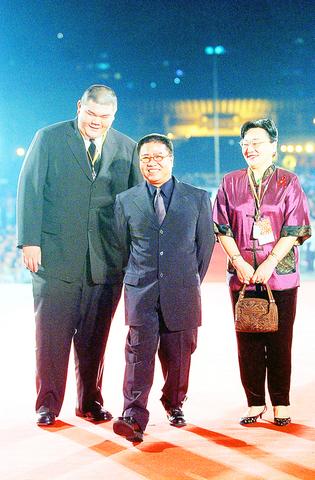The 39th Golden Horse Awards got started yesterday evening in Kaohsiung with an abundance of Hong Kong contenders and plenty of relatively new faces. Despite the almost total dominance of Hong Kong talent, Chang Tso-chi picked up the Best Picture award for The Best of Times, one of only five and the only significant award picked up by a Taiwan film.
The people of the port city turned out in force to greet the stars, but the flood of southern hospitality and passion made an odd contrast with the blandness of the award ceremony itself. The Kaohsiung City Government has thrown itself behind the event with considerable vigor, contributing NT$16 million and the use of the splendid Kaohsiung Cultural Center as the venue. But this didn't do much to balance the feeling that the Golden Horse Awards this year are more of a Hong Kong event than a Taiwanese one.

PHOTO: TAIPEI TIMES
The lack of major films or big name stars in the nominations somewhat detracted from the event from the start. And then, with Hong Kong films sweeping up most of the important acting awards, and maintaining a strong hold on the technical categories, Taiwan seemed likely to be totally ignored at its own film festival.
The Best of Times was Taiwan's only real medal hope in the major awards. It went into the competition with nine nominations, behind Hollywood Hong Kong by Hong Kong director Fruit Chan, already a veteran of the Golden Horse, who garnered 14 nominations, a Golden Horse record. Chang took a ride on an emotional roller coaster during the course of the award ceremony as Best of Times was beaten out repeatedly by Hong Kong films. Winning the Best Taiwan Film of the Year seemed to announce the end of major award hopes early in the ceremony. The film did pick up the Audience award, but it was the sad truth that there were no other local choices.
Perhaps most galling for Chang was to see first-time actor Kao Meng-jie
July Rhapsody, which was not nominated in any of the major categories except best picture, was a dark horse that picked up three major awards. In a somewhat unusual move, Karena Lam, the Taiwan-born singer who has developed her career in Hong Kong, picked up Best Supporting Actress as well as Best New Performer for her role in July Rhapsody. She beat out bigger name stars for her portrayal of a precocious young girl who falls in love with her teacher, played by Jacky Cheung (張學友). After accepting her second award, Lam was virtually speechless with surprise, saying only that she would have to treat her co-star and idol Jacky Cheung to a big meal. With contracts signed for two more movies, the coup of picking up two awards will do the first-time actress no harm in her career.
July Rhapsody also picked up Best Original Screen Play for Ivy Ho, the writer of the highly regarded Comrades, Almost a Love Story (甜蜜蜜, 1996). Speaking to the Taipei Times, Ho said that although Comrades received more critical acclaim, she feels more strongly about the script for July Rhapsody.
The rather lackluster mood of the award ceremony was only broken by one award, which had many Taiwan film professionals reaching for their hankies. Ang Lee (李安), on a three-day whirlwind visit, taking time off from post-production on the Incredible Hulk which is scheduled to open in the US in June, presented a Lifetime Achievement award to Lung Sihung (郎雄), who died in early May. Lung was Taiwan cinema's great father figure, and cooperated with Lee on films ranging from Pushing Hands (1992) to Crouching Tiger, Hidden Dragon. His long time collaborator Kuei Ya-lei (歸亞蕾), who often played his on-screen wife, sang a song in memory of him. It is a tribute to Lung's high standing that the occasion came off in touching rather than maudlin fashion.
Somewhere Over the Dreamland, a film about Taiwan's Aborigines which won Best Picture in the Critic's Week section of the Venice Film Festival, failed to get nominations for any of the major categories, but picked up Best Original Film Score for Bulan Yukan, who also played the lead role in the film.
Christopher Doyle, who picked up yet another award for Best Cinematography, shrugged off the honor saying he couldn't remember how many he had already taken home. At the same time he said that he first started making films in Taiwan, so the Golden Horse still held a special place in his heart.
Another special award, that for the Best Taiwan Film Professional of the Year went to Liao Ching-sung, one of Taiwan's most senior film editors. He edited the film In Our Time back in 1976, a film regarded as the seminal work of the New Taiwan Cinema. He has since worked for all the major names in Taiwan cinema and despite repeated nominations, has never won a Golden Horse. He was nominated this year for Best of Times and yet again failed to get an award.
The winner of the Best Actress award went to Lee Sin-je, a surprise to many as this young actress only has only two films behind her, having won the Best New Performer award at Berlin just last year for Betel Nut Beauty (2001).
Leon Lai, who picked up Best Actor, was a less controversial choice although he played in the very short Three-Going Home. Although Peter Chan-Hosun did not pick up an award himself, as the director of Three-Going Home and producer, through his Applause Pictures, of The Eye, he was associated with the victories of his actors.
After picking up his Best Film award, an elated Chang commented that despite this gesture, Taiwan still lags far behind Hong Kong. He pointed out that while Hong Kong had a film "industry," Taiwan was still at the handicraft stage of development. "With the money I get for this award, I will be able to get some equipment," he quipped.
Winners at the 39th Golden Horse Awards
Best Feature Film
The Best of Times
Best Director
Fruit Chan
Best Leading Actor
Leon Lai
Best Leading Actress
Lee Sin-je
Best Supporting Actor
Anthony Hong
Best Supporting Actress
Karena Lam
Best New Performer
Karena Lam for July Rhapsody
Best Original Screenplay
Ivy Ho
Best Cinematography
Christopher Doyle
Best Taiwanese Film of the Year
The Best of Times Somewhere Over Dreamland
Best visual Effects
Centro Digital Pictures
Best Art Direction
Huang Mao-Sen
Best Make up & Costume Design
Jessie DAI
Best Action Choreography
Bruce Mang
Best Original Film Score
Bulan Yukan
Best Original Film Song
Raincoat
Huang pin-yuan for Love at 7-11
Best Film Editing
Law Wing Cheong
Best Sound Effect
Cuson Liu
Best Documentary
Spring: The Story of Hsu Chin-Yu
by Tseng Wen-Chen
How High Is the Mountain
Best Short Film
Summers
Best Taiwan Film of the Year
The Best of Times by Chang Tso-chi
Best Taiwan Film Professional of the Year
Liao Ching-sung
Audience Award
The Best of Times by Chang Tsuo-chi

Feb. 17 to Feb. 23 “Japanese city is bombed,” screamed the banner in bold capital letters spanning the front page of the US daily New Castle News on Feb. 24, 1938. This was big news across the globe, as Japan had not been bombarded since Western forces attacked Shimonoseki in 1864. “Numerous Japanese citizens were killed and injured today when eight Chinese planes bombed Taihoku, capital of Formosa, and other nearby cities in the first Chinese air raid anywhere in the Japanese empire,” the subhead clarified. The target was the Matsuyama Airfield (today’s Songshan Airport in Taipei), which

For decades, Taiwan Railway trains were built and serviced at the Taipei Railway Workshop, originally built on a flat piece of land far from the city center. As the city grew up around it, however, space became limited, flooding became more commonplace and the noise and air pollution from the workshop started to affect more and more people. Between 2011 and 2013, the workshop was moved to Taoyuan and the Taipei location was retired. Work on preserving this cultural asset began immediately and we now have a unique opportunity to see the birth of a museum. The Preparatory Office of National

China has begun recruiting for a planetary defense force after risk assessments determined that an asteroid could conceivably hit Earth in 2032. Job ads posted online by China’s State Administration of Science, Technology and Industry for National Defence (SASTIND) this week, sought young loyal graduates focused on aerospace engineering, international cooperation and asteroid detection. The recruitment drive comes amid increasing focus on an asteroid with a low — but growing — likelihood of hitting earth in seven years. The 2024 YR4 asteroid is at the top of the European and US space agencies’ risk lists, and last week analysts increased their probability

On Jan. 17, Beijing announced that it would allow residents of Shanghai and Fujian Province to visit Taiwan. The two sides are still working out the details. President William Lai (賴清德) has been promoting cross-strait tourism, perhaps to soften the People’s Republic of China’s (PRC) attitudes, perhaps as a sop to international and local opinion leaders. Likely the latter, since many observers understand that the twin drivers of cross-strait tourism — the belief that Chinese tourists will bring money into Taiwan, and the belief that tourism will create better relations — are both false. CHINESE TOURISM PIPE DREAM Back in July